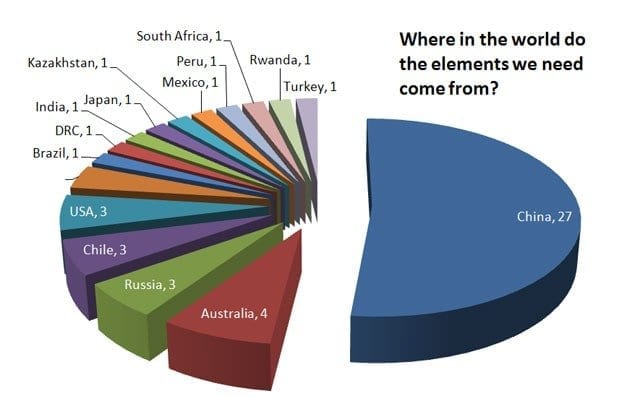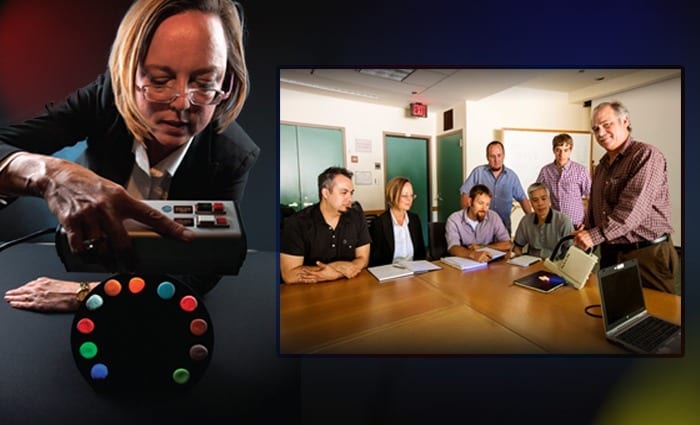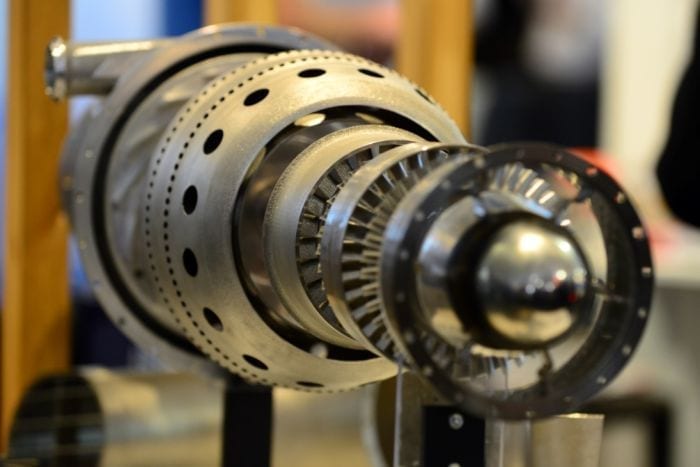
Numerous metallic elements are regarded as “critical”: on one hand, they play an ever more important role in so-called future technologies and on the other, there is a high risk of supply bottlenecks.
Small and medium-sized companies are also affected by this, and they are often not sure which of these materials they are dependent on. At a “Technology Briefing” at Empa, strategies for the sustainable use of critical materials were presented and discussed.
In conjunction with the ESM, “Stiftung Entwicklungsfonds Seltene Metalle” (Foundation for Rare Metals), Empa held a “Technology Briefing” on the topic of “Strategies for the sustainable use of critical materials” at the Empa Academy in Dübendorf. The event aimed to demonstrate ways in which industry and the research community can counter supply risks and the consequence of the ever greater use of these raw materials. As Patrick Wäger from the “Technology and Society” Department at Empa explained, raw materials/materials are regarded as critical when they are crucially important for the economy and society yet at the same time there is a relatively high supply risk. According to a study commissioned by the EU in 2014, the critical raw materials include a wide range of “rare” metals (meaning metals whose occurrence in the earth’s crust is less than 0.01 per cent by weight), such as gallium, germanium, indium, cobalt, the platinum metals and the rare earth elements. The reasons for the high supply risk are the concentration of production of these raw materials in just a few countries, low recycling rates and poor substitutability.
Maren Liedtke from DERA, the German Mineral Resources Agency, addressed the issue of the raw materials supply cycle and pointed out that the capital decline in the mining sector and in processing in particular may lead to supply deficits in the medium term. Companies must therefore keep an eye on the markets and develop safeguarding and alternative strategies. She agreed with Wäger that the geological availability of these raw materials was not the main problem even given that demand was increasing. The increasingly negative ecological and social effects of the mining of raw materials are much more worrying. According to Wäger, the scientific community and industry should therefore redouble their efforts to use these raw materials in a more sustainable way. Possible approaches are substitution by non-critical raw materials, increasing material efficiency in production processes and products, and closing material cycles.
Possible solutions for industry
Margarete Hofmann, Managing Director of ESM, gave an overview of European activities in the field of critical metals and examined, based on these, possible measures for more sustainable use of critical raw materials in the areas of extraction, material efficiency and substitution. Important accompanying measures are the setting up of platforms for the exchange of information, training and further training and the analysis of strategies and systems, for example using material flow analyses and environmental life cycle assessments.
It is also clear to industry representatives such as Ute Liepold from Siemens, Jensen Verhelle from Umicore and Andreas Mai from Hexis, that their companies are dependent on critical materials and therefore it is necessary to adopt a more conscious approach in using them. According to Liepold, this includes substitution, a more economical use of materials and the recycling of production waste as well as reuse and the recycling of discarded consumer goods. With substitution however, the devil is in the detail, as is often the case, because many different factors such as product performance and quality, costs and energy input have to be taken into consideration. In addition, substitution requires “a long preparatory period” according to Liepold and therefore requires a lot of time. Verhelle demonstrated, using germanium as an example, how Umicore is already meeting much of its requirement through recycling.
Possible solutions from the field of research
Read more: Are we independent of rare metals?
The Latest on: Rare earth metals
[google_news title=”” keyword=”Rare earth metals” num_posts=”10″ blurb_length=”0″ show_thumb=”left”]
via Google News
The Latest on: Rare earth metals
- Up, Up, Down, Down: Everyone’s a winner in an astounding April for major metalson May 1, 2024 at 5:20 am
Every major commodity tracked by Up, Up, Down, Down won in April in a massive month for metals, with gold ... Read More The post Up, Up, Down, Down: Everyone’s a winner in an astounding April for ...
- OD6 to hunt more Esperance rare earths with new fundson May 1, 2024 at 1:06 am
OD6 Metals will use new WA Government funding to drill further into its Splinter Rock rare earths project near Esperance. The company’s maximum $180,000 grant has been earmarked for drilling at two ...
- The Role of Earth-Abundant Catalysts in Making Green Hydrogen Even Cleaneron April 30, 2024 at 9:00 am
In the relentless quest for sustainable and green energy solutions, a groundbreaking discovery by researchers led by Ryuhei Nakamura from the RIKEN Center for S ...
- 3 Rare Earth Stocks Crucial for Advanced Technologieson April 30, 2024 at 4:07 am
InvestorPlace - Stock Market News, Stock Advice & Trading Tips Wall Street has been witnessing the rapid transformation of the technology ...
- Ucore says Wicheeda rare earth carbonate suitable for commercial-scale processingon April 29, 2024 at 11:22 am
Ucore Rate Metals (TSXV: UCU; OTCQX: UURAF) has deemed a 26-tonne sample of mixed rare earth carbonate (MREC) from the Wicheeda mine to be suitable for processing on a commercial scale using Ucore’s ...
- American Rare Earths Project Rejects $400 Million Buyout Offer From California Firmon April 29, 2024 at 11:15 am
American Rare Earths, which may have one of the world's largest rare earths operations near Wheatland, Wyoming, has rejected a $400 million buyout offer from a group of investors from Oakland, ...
- Defense Metals Receives Positive Results from Ucore Rare Metals Inc. on its Wicheeda Rare Earth Carbonate Sampleon April 29, 2024 at 6:59 am
Defense Metals Corp. ("Defense Metals" or the "Company"; (TSXV: DEFN) (OTCQB: DFMTF) (FSE:35D) is pleased to announce that Ucore Rare Metals Inc. ("Ucore")(TSXV: UCU) received and tested a Wicheeda ...
- Ucore Qualifies Wicheeda Mixed Rare Earth Carbonate for RapidSX Technology Processing at Commercial-Scale Facilitieson April 29, 2024 at 6:16 am
Ucore Rare Metals Inc. announces:the completion of initial testing of a rare earth carbonate sample generated from Defense Metals' Wicheeda Project in British Columbia; and determination of the ...
- Lynas Rare Earths: The Storm Is Not Over, Yeton April 27, 2024 at 6:32 am
Discover Lynas Rare Earths' disappointing Q3 results, declining prices, inventory management, and progress on projects. Read the article for more details.
- The Dirtiest Side of EVs: Rare Earths and Conflict Metalson April 26, 2024 at 2:43 pm
"Typical mining operations for rare earth mines vary from hard rock to heavy-mineral sands and ionic adsorption clay operations," de Jonge said. "For hard rock assets (the most common), metallurgy is ...
via Bing News










